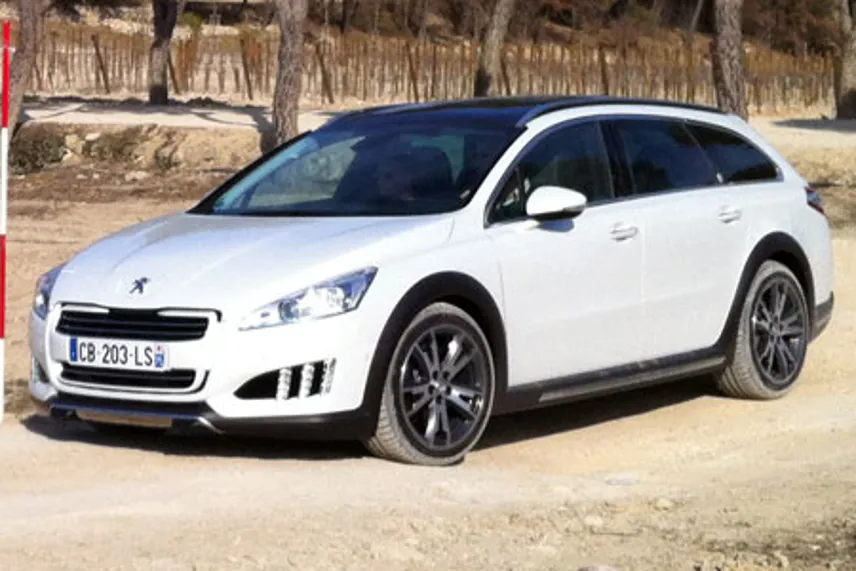Review
No Peugeot company car driver will ever put the 508 RXH through the tough test witnessed on its launch to the media.
But it served to illustrate the benefits of a four-wheel drive system based on its diesel-electric powertrain. It climbed short 60° inclines with no trouble, and it coped with axle-twisting one-wheel-in-the-air antics.
The 508 RXH also looks the part of a semi off-roader with suspension 50mm higher than a standard 508 SW and plastic around the wheel arches.
Peugeot does not expect the 800 or so RXH drivers in the UK to take their vehicles off road, and its maximum towing capacity is a relatively meagre 1,100kg – 200kg less than the next best in the 508 family and 800kg lower than the near equivalent powered 2.2 HDi GT.
But luckily there is far more to the 508 than a nod to covering rough terrain or pulling a heavy trailer.
The car, which has a similar power output to the 508 SW 2.2 HDi GT, has CO2 emissions of 107g/km compared with the 154g/km of its conventionally powered sibling and, being a hybrid, avoids the 3% supplement on BIK tax.
Priced as a premium product at £33,695 on the road, it feels like an upmarket car, with standard satellite navigation, colour head-up display, automatic headlights, part-leather upholstery and electrically adjustable and heated front seats. And the elegant profile of the 508 SW disguises the extra height built into the car’s suspension.
Like the other Peugeot hybrid currently on the market, the 3008 Hybrid4, the 508 RXH uses a 163bhp 2.0-litre diesel engine that powers the front wheels. An electric motor, powered by a battery pack under the car’s luggage area drives the rear-wheels only.
There are four powertrain modes: automatic, sport, 4WD and ZEV. Automatic optimises efficiency by managing the use of the electric motor and allowing the RXH to travel on only electric power as much as possible.
Sport allows maximum electric power to boost the engine, resulting in a maximum output of 200bhp, with the transmission optimised for performance rather than fuel economy.
Selecting 4WD ensures the electric motor and engine both remain in use, with battery charge optimised to ensure no interruption in drive to the rear wheels.
ZEV allows about two miles or so silent running at low speed, and on our test route our two-thirds charged battery allowed the RXH to travel for more than a mile before the battery depleted entirely and the engine was forced to restart.
This type of driving, with no engine noise, is very relaxing and easy to get used to around town.
The sequential electronic manual gearbox fitted to the Hybrid4 drivetrain (and also used in the 508 1.6 e-HDi) is often loathed by the likes of us motoring journalists, because of its staccato upshifts compared with a conventional torque-converter automatic, or a dual-clutch transmission.
And there is sometimes a worrying delay when trying to get the gearbox to kickdown for overtaking when relying on the technology to fend for itself.
However, Peugeot has improved the former has been improved through the electric motor partly disguising the gaps in traction between the gears when changing up, even more cleverly than was achieved in the 3008 Hybrid4. Unfortunately, kickdown can still be a problem.
Like a standard 508, the RXH is roomy and comfortable and its increased ride height makes it a little easier to get in and out. Ride comfort is compromised by over-sized wheels (as with many cars these days), resulting in generally good absorption of bumps marred by an occasional thump through the supple suspension as the tyres crash over a pothole.
Luggage space is less than in a conventional SW because of the hybrid components housed below the boot floor. A minimum of 400 litres, and a puncture repair kit rather than a spare wheel should still allow most luggage needs to be served, while the rear seats fold flat to further boost capacity.
The 508 RXH is an attractive and comfortable car. Even if its exceptionally good official fuel consumption of 68.9mpg can’t be repeated in real life (Peugeot suggested an average of 51.4mpg was achieved by its own staff on the test route, although some of the media achieved better), the 107g/km offers a large car for minimal BIK tax liability. This will be what counts when it comes to tempting a few user-choosers away from premium badge cars.
Author:
Simon Harris
Specs
| Manufacturer | Peugeot |
| Model | 508 |
| Specification | |
| Model Year | 0.00 |
| Annual VED (Road tax) | £0 |
| BIK List Price | £33,640 |
| CO2 | 107g/km |
| BIK Percentage | 12% |
| Insurance Group | N/A |
| CC | N/A |
| Fuel Type | Diesel |
| Vehicle Type | |
| Luggage capacity (Seats up) | N/A |
Running Costs
| P11D | £33,640 |
| Insurance group | N/A |
| Fuel Type | Diesel |
| Cost per mile | 0.00ppm |
| Fuel | 0.00ppm |
| Depreciation | 0.00ppm |
| Service maintenance and repair | 0.00ppm |
Info at a glance
-
P11D Price
£33,640
-
MPG
68.9 -
CO2 Emissions
107g/km -
BIK %
12% -
Running cost
3 Year 60k : N/A 4 Year 80k : N/A -
Fuel Type
Diesel















